Happiness
We all seek happiness, but what does it truly mean to be happy? And how can we cultivate a sense of lasting joy and fulfillment in our lives?

On this page
What Happiness Is and Isn’t
When researchers study happiness, they often focus on three key concepts:
- Life Satisfaction: This refers to how happy and content you are with your life as a whole. It's about reflecting on whether your life is going well and if you're satisfied with various aspects, such as your relationships, career, health, and personal achievements.
- Positive Affect: This is the extent to which you feel excited, active, and alert. High positive affect means you're full of energy, highly focused, and deeply engaged in your activities. Low positive affect, on the other hand, might make you feel sad, tired, and less motivated to enjoy or participate in activities that usually bring you pleasure.
- Subjective Well-Being: This concept combines both life satisfaction and positive affect, assessing how you evaluate and feel about your life overall. It's a personal gauge of your happiness and emotional well-being.
These scientific terms can be quite technical so to make simpler, positive psychology researcher Sonja Lyubomirsky describes happiness in her book, The How of Happiness, as:
“Happiness is the experience of joy, contentment, or positive well-being, combined with a sense that one’s life is good, meaningful, and worthwhile.”
In other words, happiness boils down to two main aspects:
- Experiencing Positive Emotions
- Feeling That Life Has Meaning and Purpose
With this understanding of what happiness is, it's also important to clarify what happiness is not.
Happiness Is Not the Absence of Negative Emotions
It's a common misconception that happiness means never feeling sad, angry, or anxious. In reality, negative emotions are a natural part of life and can actually enhance your overall happiness by providing contrast. People who constantly chase pleasure and avoid discomfort aren't necessarily happier than those who accept and experience a full range of emotions. The presence of negative feelings allows you to appreciate positive emotions more deeply.
Happiness Is Not 'One Size Fits All'
The saying, 'Happiness is what you make it,' means that happiness is subjective and unique to each person. No one else can dictate what should make you happy. Each individual has different values, preferences, and circumstances, so what brings happiness to one person might not work for another.
Happiness Is Not Dependent on External Factors
True happiness doesn't come from material possessions or external circumstances; it's about how you feel inside. While external factors, like buying a new car or reaching a milestone, can bring temporary joy, it won't bring you lasting happiness. Lasting happiness comes from within, so it's important to focus on what truly fulfils you and to nurture those inner sources of joy and contentment.
How Much Control Do We Have Over Our Happiness?
The question of how much control we have over our happiness is a complex one, as there are many factors that can influence our subjective well-being. However, based on scientific research, it appears that we do have some degree of control over our happiness, although this may vary depending on individual circumstances.
Sonja Lyubomirsky has proposed the concept of the "happiness pie" to explain the different factors that contribute to one's overall happiness.
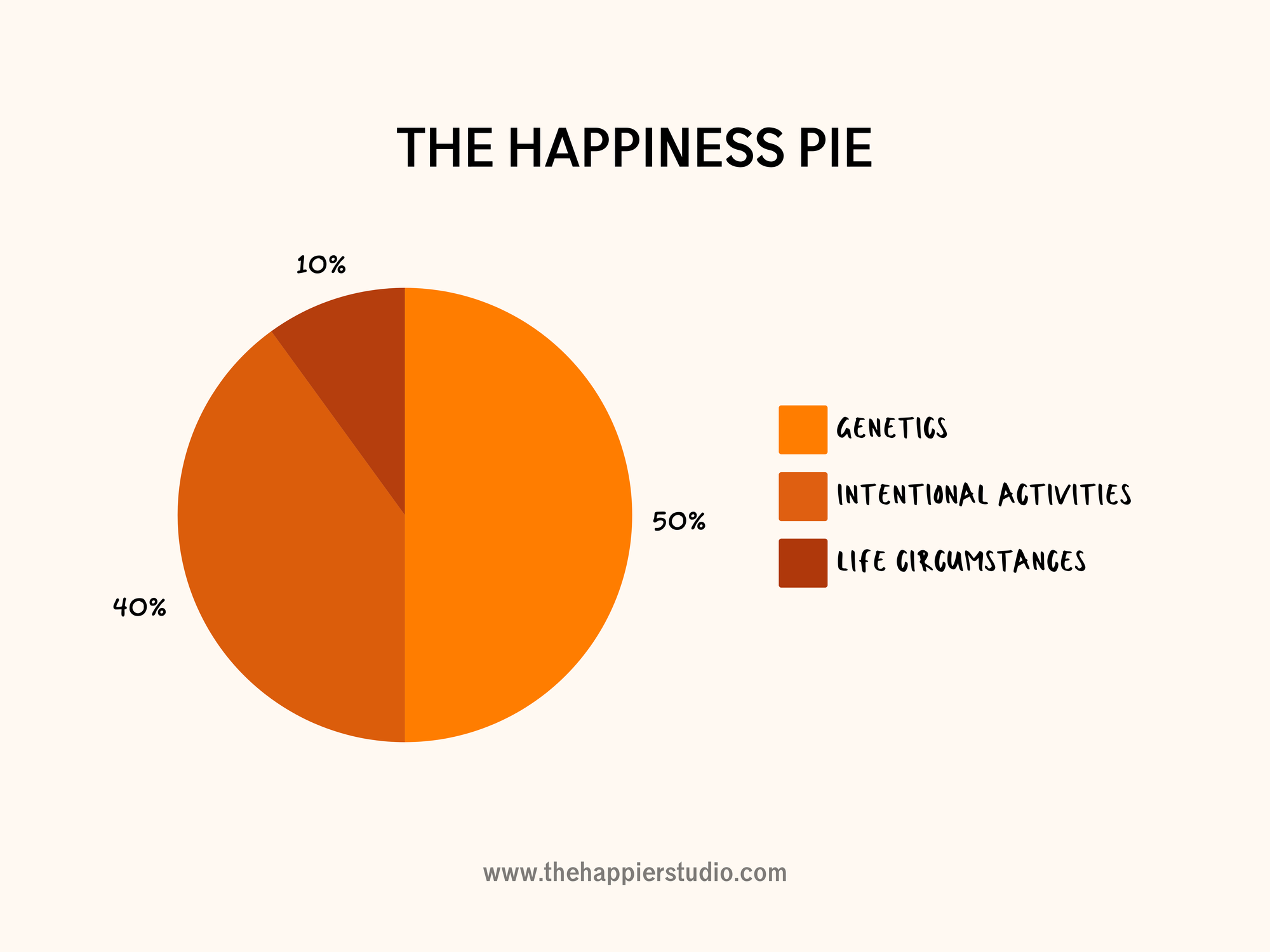
According to the happiness pie, which is simply a gross oversimplification, our happiness level is influenced by three main factors: genetics, life circumstances, and intentional activities.
- Genetics: Our genetics, or the biological traits that we inherit from our parents, can play a role in determining our happiness level. Studies have shown that genetic factors can account for up to 50% of the variability in individual happiness. This means that some people may be born with a natural disposition towards happiness, while others may be more predisposed to negative emotions like anxiety and depression.
- Life Circumstances: Are the events and conditions that happen to us or around us, often beyond our control, and can have a significant impact on our overall level of happiness. It's the one that everyone wants: If I get that job, if the person I love marries me; then I'll be happy. But this is not true because of homeostasis or the hedonic treadmill, where we quickly adapt to positive or negative changes in our lives and return to our previous baseline level of happiness.
- Intentional Activities or Habits: Habits are the only thing you can control and therefore is the only thing that really matters - it helps you manage your genes and make your circumstances systematically better. Research has shown that habits have a significant impact on our happiness level, and can even help us overcome negative life circumstances or genetic predispositions towards negativity.
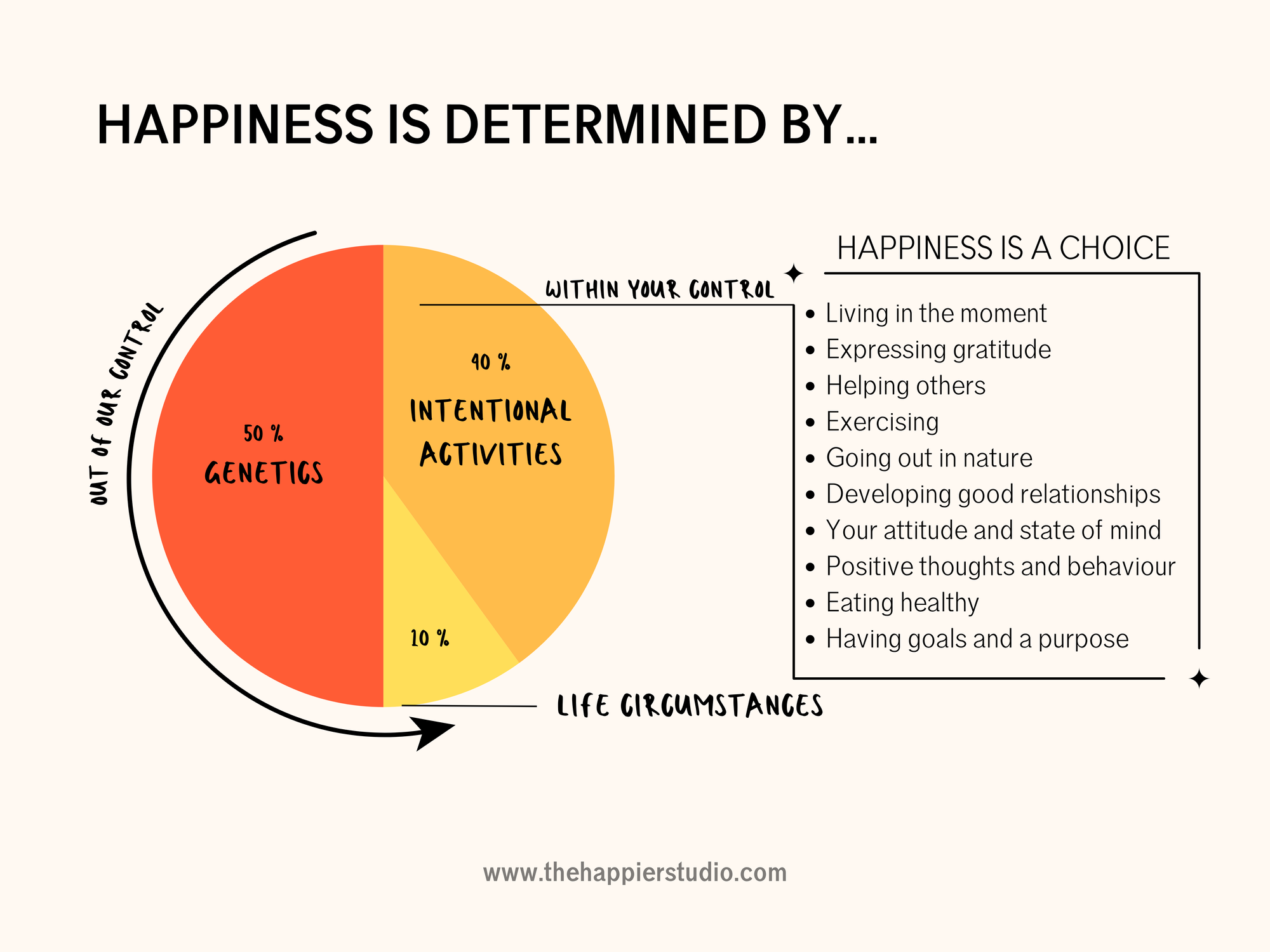
So while our genetics and life circumstances can play a role in determining our happiness level, intentional activities or habits provide us with a powerful tool for increasing our happiness and well-being.
What We Think Will Make Us Happy But Won’t
Most of the things we think will make us happy don't actually make us any happier. Yet, most people chase these things in the hope to experience more happiness.
In Western societies, people often think that things like money, the perfect job, or materialistic goods will make them happy. However, here's why that's not the case:
- Why Money Won't Make You Happier: Research by Ed Diener, who was a psychologist and coined the expression 'subjective well-being', found that money doesn’t necessarily lead to more happiness. This is because subjective well-being is largely influenced by factors such as relationships, personal values, and a sense of purpose, rather than material wealth. Of course, it's important to note that if you're struggling to pay your bills, making more money can make a huge difference by relieving the stress of not being able to cover your basic expenses. But once you've got your essentials covered, extra money doesn't bring as much happiness as we often think it would.
- Why The Perfect Job Won't Make You Happier: When it comes to our jobs, we often think that a ‘good job’ is synonym to earning a lot of money. But as we’ve just seen above, beyond a certain point, money doesn't really buy you any more happiness. Yet, we still predict that earning more money will make us happy. The psychologist I mentioned before, Sonja Lyubomirsky, conducted a study on how much people really think is the salary they need versus the salary they actually have. They found that people who earn $30,000, believe $50,000 would make them truly comfortable. So, if someone earns $100,000 – you’d expect them to be content, right? Surprisingly, those who earn $100,000 believed they need $250,000 to be happy. This shows that our idea of a "comfortable salary" keeps rising as we earn more, making it harder to feel satisfied with our income over time.
- Why Awesome Stuff Won't Make You Happier: Research shows that wanting more stuff and thinking that it'll make us happy might actually backfire. A study by Nickerson et al, followed people from their college days all the way to 20 years later. The researchers asked participants, "Are you happy with your life? Did wanting lots of things back then predict how you're feeling now?" What they found was that the people who were all about wanting stuff ended up less happy 20 years later compared to those who weren't so into material things. In fact, the study found that those who were really into material stuff were more likely to have mental health issues than those who weren’t. So, the big question is: Does having awesome stuff really make us happier? Not really. And trying too hard to get it might actually make us way less happy than if we were to focus on wanting less.
Why Our Expectations Are So Bad
Unfortunately, humans have a lot of biases that lead to what scientists call miswanting. This refers to the phenomenon of people overestimating the impact that certain events or outcomes will have on their happiness, and especially in the future. So, what are the biases that can lead to these miswantings?
We Simply Get Things Wrong
Just think about optical illusions - sometimes what we think we see, is not really true. Take for example the popular optical illusion by the German psychologist Franz Muller-Lyer: The Muller-Lyer illusion.
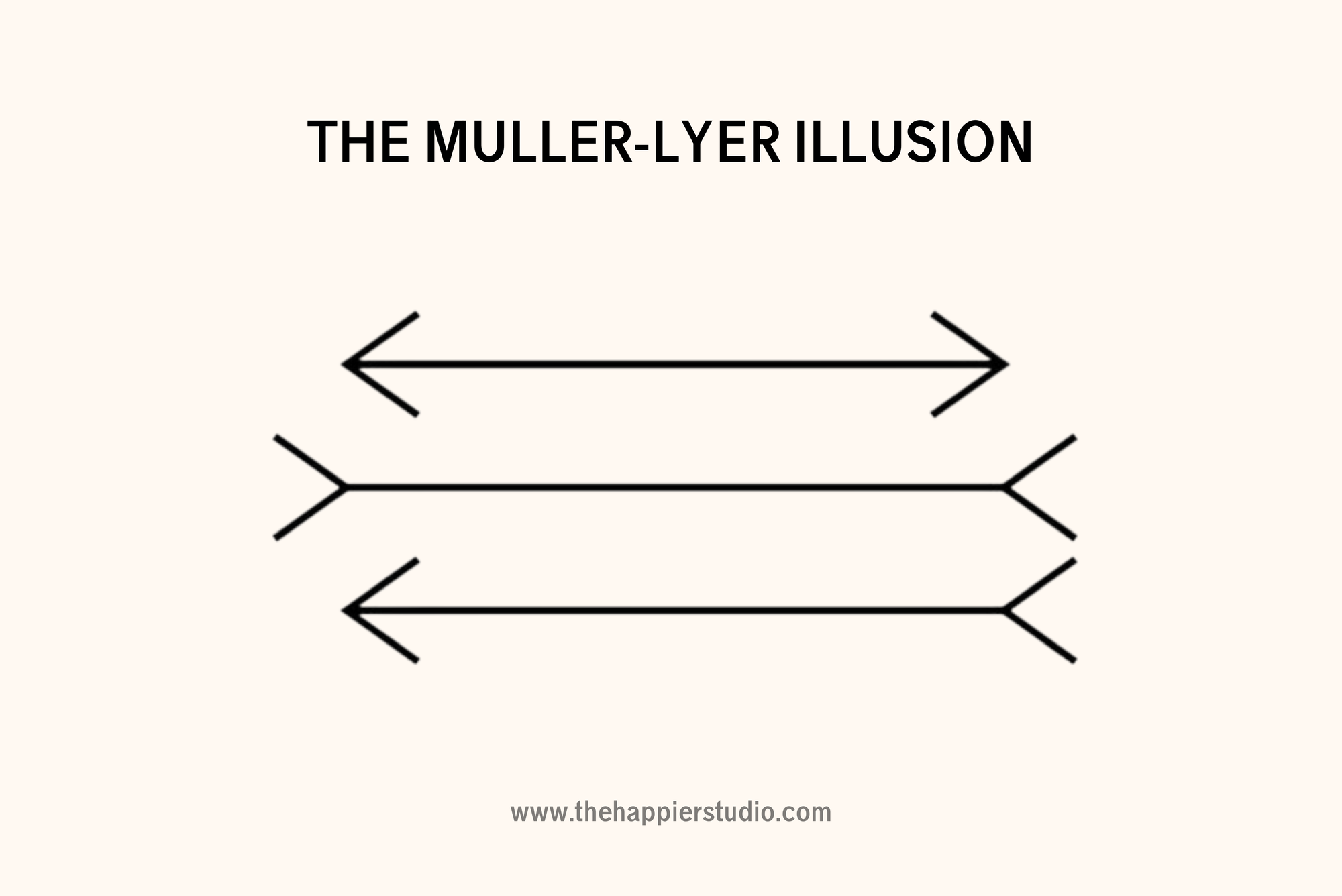
The illusion consists of two lines of equal length, one of which has arrows or "wings" pointing inward, while the other has arrows pointing outward. Despite the lines being the same length, the line with the inward pointing arrows appears shorter than the line with the outward pointing arrows.
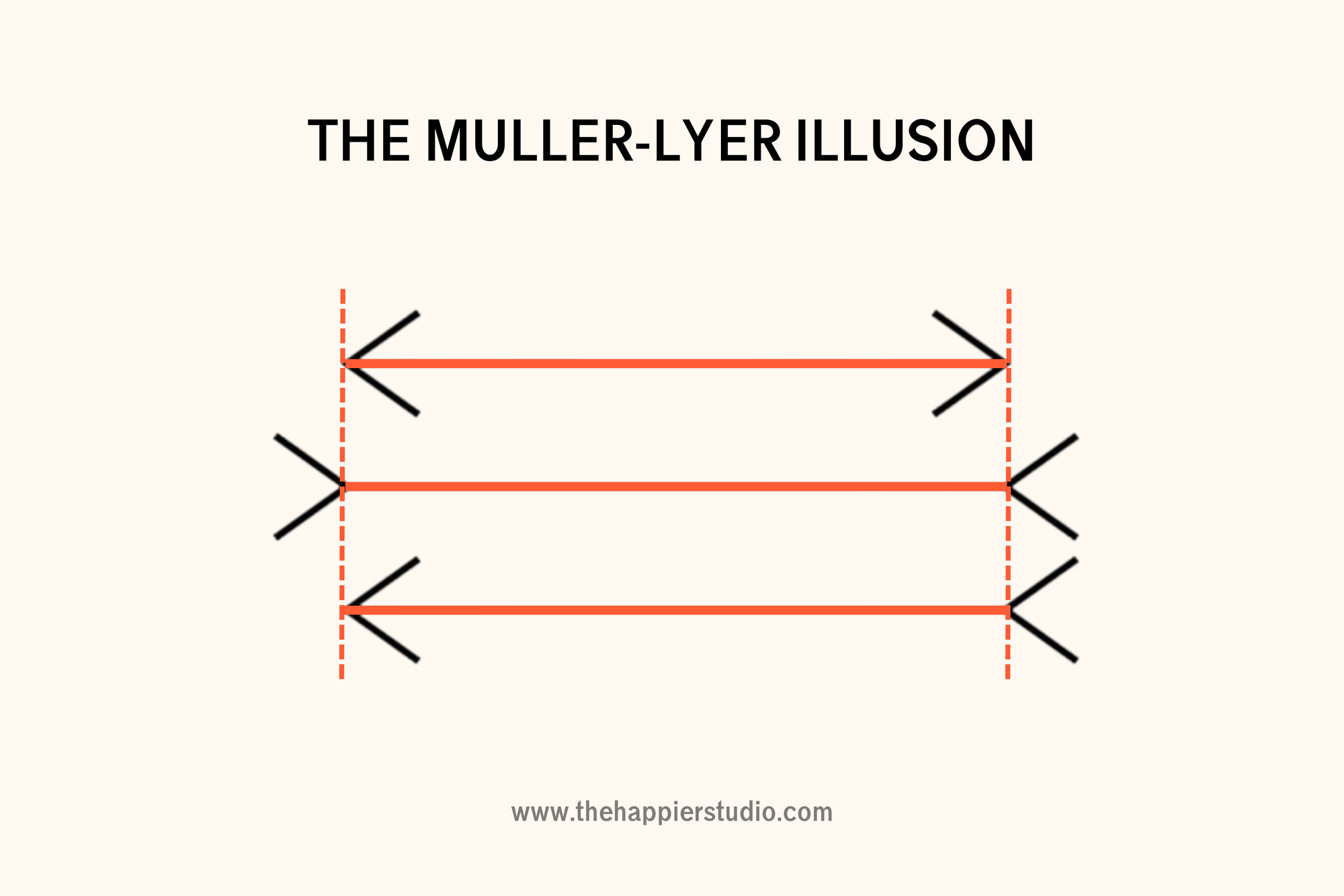
So, even though we think that the lines are not the same length, they indeed are - meaning we sometimes simply get things wrong.
We Don't Think In Absolutes
Another bias is that our brains don't think in absolutes, but rather in relative terms. This means that we perceive things in relation to the context or environment in which they are presented - also known as a reference point.
One of the best-known examples of this is the Ebbinghaus illusion, which illustrates how our perception of the size of an object can be influenced by the size of surrounding objects.
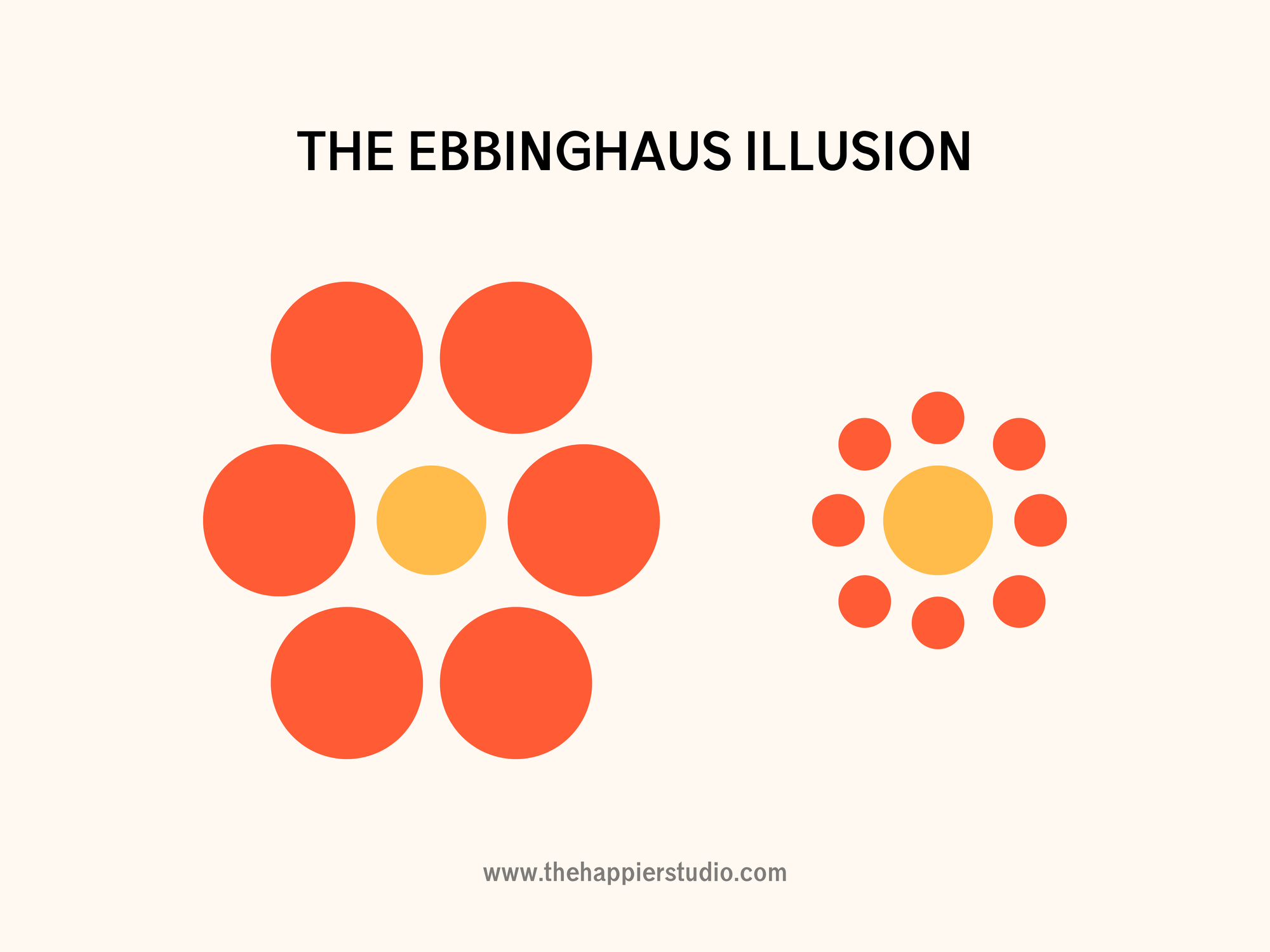
Despite the fact that both circles are the same size, the one surrounded by smaller circles appears larger than the one surrounded by the larger circles.
In other words, when we see the circle surrounded by smaller circles, our brain interprets it as being larger because the smaller circles make it seem relatively smaller in comparison - or we see things in relative terms, not absolute terms.
We Get Used To Things
Another reason as to why our expectations of what makes us happy are so bad, is because we get used to things, which is also known as hedonic adaptation.
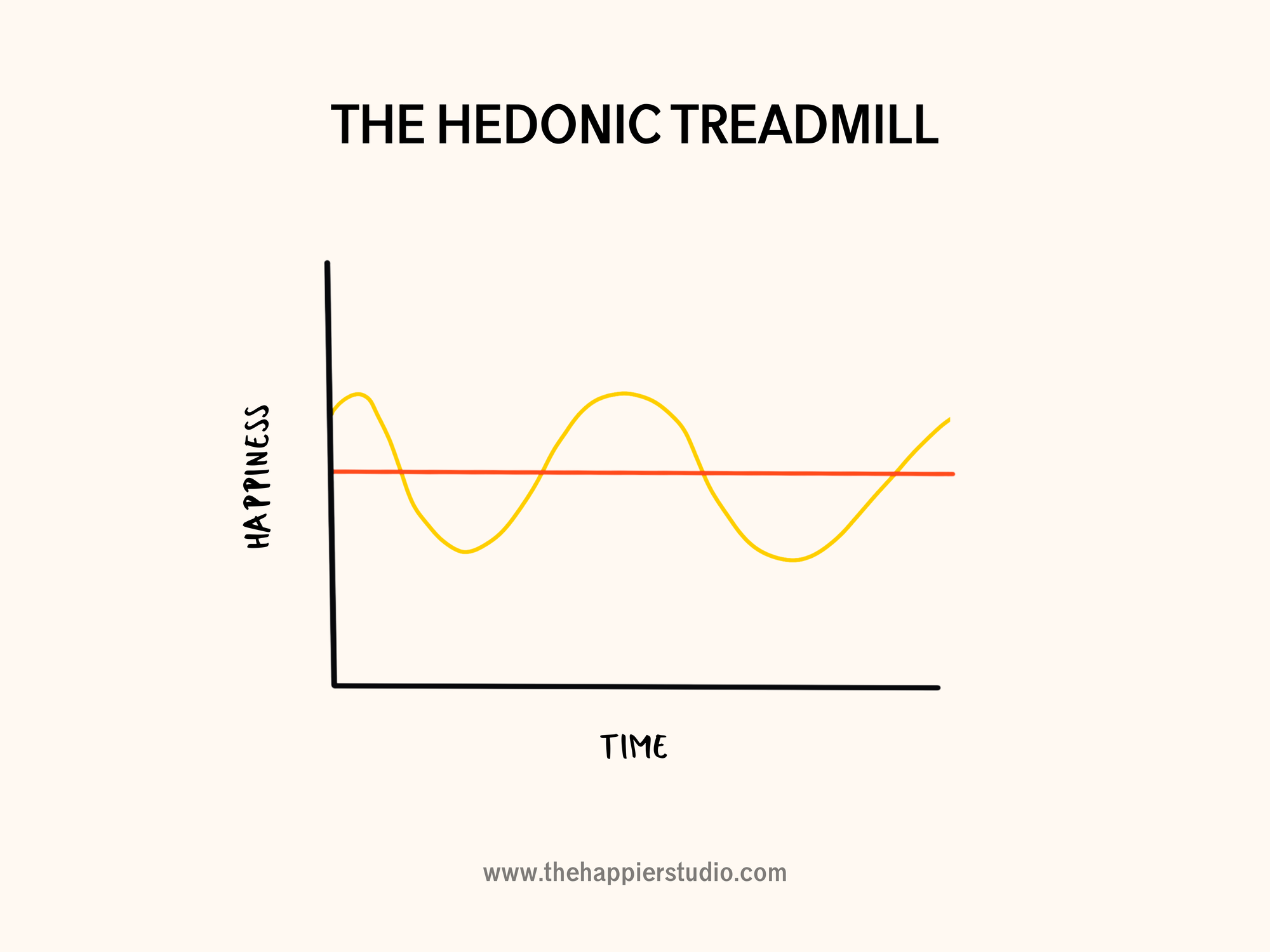
The problem with pursuing these pleasurable things - money, more stuff, promotion - is that once we acquire them, they tend to become a permanent part of our lives. And as we get used to having these things, they no longer bring us the same level of happiness as before, and our expectations for future happiness are reset.
How To Overcome These Biases
Luckily, there are some things we can do to overcome these biases or miswantings.
Invest In Experiences, Rather Than Things
Investing in experiences can provide a break from the hedonic adaptation cycle. As experiences are often unique and cannot be replicated, they are less susceptible to the effects of the hedonic adaptation. For instance, a trip to a new country can provide a sense of novelty and adventure that cannot be replicated by material possessions.
Thwart Hedonic Adaptation
Besides material possessions, we can also get used to our jobs, salaries or even our romantic relationships. So, how can we make sure we don't fall into the trap of adaptation?
- Savouring is the act of fully engaging with and enjoying positive experiences in your life. It involves taking the time to fully appreciate and enjoy the pleasant sensations and emotions that arise during enjoyable experiences, such as when you go for a walk or eat ice cream at the beach.
- Negative Visualisation refers to a technique used in ancient Stoic philosophy that involves contemplating worst-case scenarios to gain a deeper appreciation for the present moment and to build resilience in the face of adversity.
- Practicing Gratitude. Gratitude can be defined as the act of feeling thankful and appreciative for the things you have in your life. By intentionally noticing and acknowledging the good things in your life, you can cultivate a genuine sense of gratitude that helps you appreciate the abundance you have, rather than taking it for granted.
Reseting Your Reference Point
Reference points have a significant impact on our perceptions of happiness, even when we are unaware of their influence. Luckily, there are ways you can break free from this cycle and reset your reference points.
- Concretely Re-experiencing refers to going back to a previous reference point. For example, maybe your dream job was to work at Apple, but now that you’ve been working there for over a year, the novelty is gone. Where you once felt stokes, it now has become your new norm. So to increase your happiness again, you need to think back to the time before you got the job at Apple, and remind yourself what that time was like.
- Avoid Social Comparison. Unhappiness happens when you compare yourself unfavourable to other people. Unfortunately, in today's world, this has become easier than ever with the rise of social media - but not impossible. In particular with social media, you can focus on limiting your social media use, unfollowing accounts that trigger negative emotions, or even completely getting rid of it.
- Increase Your Variety. Whenever you visit one of your go-to restaurants, chances are you order the same dish. Although at first it may be really enjoyable and satisfying, over time you may become adapted to it and it may not provide the same level of pleasure or excitement as it once did. By switching up your order and trying new dishes, you can break up your adaptation and create new reference points, which can make the experience more enjoyable and satisfying again.
What Actually Makes Us Happy?
I've been talking a lot about the things we think will make us happy but actually won't. But what are some of the things that actually make us happy and should be on top of our priority list?
Social Connection
The Harvard Study of Adult Development - the longest study ever conducted on human happiness - found that relationships are the key to health and happiness. Having supportive and nurturing relationships is a buffer against life’s stresses and protects overall health. More so, the quality of these relationships is the biggest predictor to living longer and happier.
Kindness and Gratitude
Practicing kindness and gratitude are two key factors that contribute to overall happiness and well-being. Kindness involves doing something for others without expecting anything in return, which can have a positive impact on both the giver and the receiver. Whereas practicing gratitude involves expressing appreciation for the good things in your life.
Flow and Character Strengths
Finding the perfect job may not necessarily bring happiness, as external factors such as salary and job title are not always indicative of job satisfaction. However, focusing on finding flow - a state of deep engagement - within a job and matching it with your character strengths - positive traits and qualities inherent in you - has been found to have a positive impact on overall happiness and well-being.
Time Affluence
Time affluence refers to the perception that one has an abundance of time and is not rushed or hurried in their daily life. Unfortunately, most don't feel like they have an abundance of time and rather feel time-poor, which is the feeling of having too many things to do in a day and not enough time to do them. To feel more time affluence, you should shift your attention away from work and making money to having more and better time, such as by savouring your daily experiences.
Mindful Awareness
Mindful awareness, also known as mindfulness, is the practice of being present and fully engaged in the current moment without judgment. Making time in your day to be present - like journaling or meditating - will reduce stress and feelings of anxiety and depression.
Healthy Practices
Without your health, everything else in life would fall apart. As Steven Bartlett writes in his book The 33 Laws of Business and Life: “You could remove my dog, God forbid, and I'd still have everything else on the table; you could take my girlfriend off the table, and I would still have everything else; but if you removed the table - my health - everything falls to the floor. I would lose it all.” So health - diet, exercise, and sleep - should be the number one priority in everyone's life.
Best Happiness Books
- The Happiness Advantage by Shawn Achor
All Happiness Articles
- Why Chasing Money Will Make You Miserable
- How Instant Gratification Impacts Your Long-Term Goals
- 5 Rules Of Happiness That 99% Of People Ignore
- 3 Biggest Myths About Happiness
- 3 Practical Ways To Become Happier
- The 4 Journaling Techniques for Gratitude
- Why You Are Not Happy With Your Life
- Why Your Brain is Not Wired for Happiness
- How to Access Happiness On Demand
- The Satisfaction Trap: Why Wanting Less Makes You Happier
- How to Build a Foundation for Real Happiness
- How to Overcome Negative Thoughts and Overwhelm
- 5 Principles to Activate Happiness
- Why Resolutions Don’t Work for Happiness